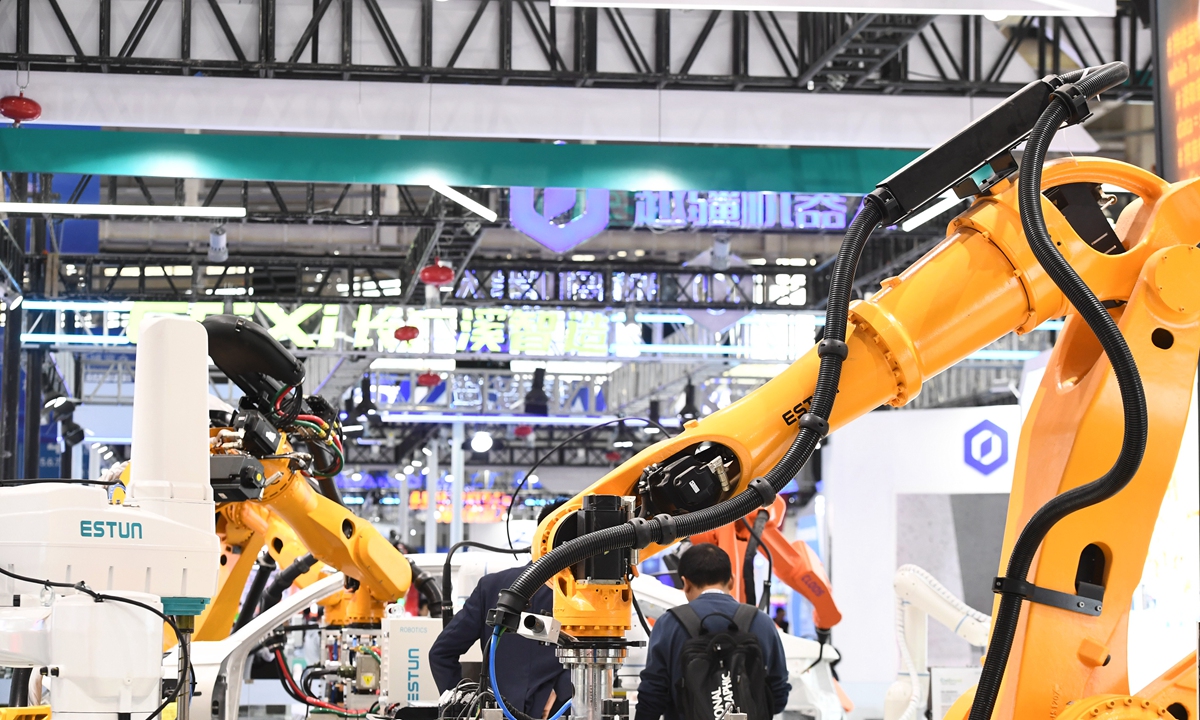China sees no ‘exodus’ of foreign-funded companies: says Chinese ambassador to Japan

This photo taken on Nov. 5, 2022 shows a Toyota hydrogen fuel cell electric vehicle exhibited at the Automobile exhibition area of the fifth China International Import Expo (CIIE) at the National Exhibition and Convention Center (Shanghai) in east China's Shanghai. The fifth CIIE is scheduled on Nov. 5-10 in China's economic hub Shanghai. Photo: Xinhua
China has seen no “exodus” of foreign enterprises. Against the backdrop of the global decline in cross-border investment, foreign investors’ enthusiasm for investing in China has not waned, and they remain largely optimistic about the country’s future growth prospects, Chinese Ambassador to Japan Wu Jianghao said in a recent interview with Japanese media.
China, a market-oriented economy, experiences the normal phenomenon of foreign companies entering and exiting the market, Wu said. Adding that while some foreign companies choose to withdraw from the market, there has not been a large-scale “fleeing” of foreign-invested companies, Wu said, according to a statement the Chinese embassy published on its website on Friday.
In recent years, a variety of factors including the COVID-19 pandemic, the churning geopolitical tensions as well as rising trade protectionism have contributed to a general decline in global cross-border investment, Wu said.
Citing statistics from the United Nations Conference on Trade and Development, Wu said that global cross-border direct investment plunged by 18 percent in 2023. The main destinations for foreign direct investment (FDI) also experienced significant declines, with India’s FDI decreasing by 47 percent and the Association of Southeast Asian Nations (ASEAN) by 16 percent.
In contrast, China saw the launch of 53,766 new foreign-invested enterprises in 2023, up 39.7 percent year-on-year. The actual use of foreign capital amounted to 1.13 trillion yuan ($158 billion), the third highest year in history after 2021 and 2022. Additionally, China’s investment structure has kept on improving, with the proportion of foreign investment in high-tech industrial sectors reaching 37.4 percent, the ambassador said.
Given China’s ongoing economic transformation and upgrade, the rapid rise of domestic enterprises, and the increasingly competitive market environment, the exit of some foreign enterprises due to their lack of competitiveness is a result of market mechanisms, he said.
It is also understandable if foreign enterprises adjust their business presence in China based on market rules. In fact, Chinese enterprises are also transferring some of their production capacity overseas. “If foreign enterprises have any feedback on China’s business environment, we are willing to listen carefully and actively address their reasonable concerns,” Wu said.
In 2023, Japanese investors established 888 new enterprises in China, a year-on-year increase of 7.3 percent, making it the third largest source of foreign investment in China, according to Wu.
A survey by the Japan External Trade Organization showed that 90 percent of Japanese companies hope to expand their business in China or maintain their current status. And a survey conducted by the Japan Chamber of Commerce and Industry in China among its 1,700 member companies indicated that 88 percent of Japanese companies still consider China an important market.
The rate of return on investment for foreign investors in China has been around 9 percent in the past five years, while Japanese companies achieved a return of 18 percent in 2022. For Japanese companies, the return on investment in the Chinese market remains higher than other markets, Wu said.
Since the normalization of diplomatic ties of the two countries half a century ago, the economic and trade cooperation between China and Japan has made great leaps in both quantity and quality. Bilateral trade has exceeded $300 billion for several consecutive years, and Japanese enterprises have accumulated investments in China exceeding $130 billion, demonstrating strong resilience and enormous potential, Wu said.
“Meanwhile, it should be noted that both the economic and trade volume and investment growth between China and Japan dropped in 2023, which requires high attention and efforts to address at an early date,” Wu said. He suggested that the two countries adhere to their partnership position, broaden their cooperation fields, and jointly build an open regional and global economy. The two should work together to maintain the stability and smooth operation of the global supply chains and promote continuous recovery and development of the world economy, he said.
Global Times

